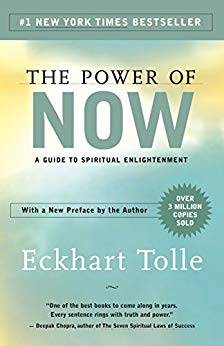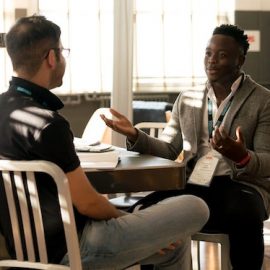

This article is an excerpt from the Shortform summary of "The Power of Now" by Eckhart Tolle. Shortform has the world's best summaries of books you should be reading.
Like this article? Sign up for a free trial here .
Why is it important to be present in a relationship? How can a lack of presence sabotage your relationship?
When you are not present in a relationship, it’s very easy to misconstrue actions and situations and become reactionary, even explosive. Sooner or later, your lack of presence will poison the relationship to the point where it can no longer be mended.
Practicing mindfulness in relationships is a two-step process: 1) first, accept yourself, and 2) second, foster non-judgmental communication with your partner. We’ll discuss both of these principles below.
Both Partners Must Be Present
Without presence, a romantic relationship will fall victim to a love/hate cycle because true love can only be felt through presence. The ego will make you misconstrue actions and situations and cause you to be reactionary, eventually poisoning the relationship.
Don’t Require the Other for Happiness
If you look to your partner to complete you or make you happy, you are placing your fulfillment on an external factor, which will never lead you to true peace and happiness. Here are a few reasons love can fail.
Using love as a substitute in this way can be viewed the same way as using food, drugs, shopping, and anything else that brings temporary satisfaction in an effort to mask deeper feelings of pain and dissatisfaction.
- When these substitutes fail you — whether the love fades, the drugs run out, or the gambling losses catch up with you — the pain is worse than before.
Your partner will eventually make a mistake or do something that fails to meet your (ego’s) expectations.
- Since your partner has inevitably failed to make you whole, this will trigger the ego’s fear that, once again, you are supposedly incomplete.
- The feelings of fear and pain will bring you out of your previous state of bliss and into the darker end of the cycle.
Your ego will blame your partner’s failure for the pain, and your pain-body will cause you to attack her.
- Your attack may trigger your partner’s own pain-body to attack you in return, creating a vicious cycle.
Be Present In Your Relationship
The only route for happiness, even in a relationship, is to be present yourself.
To foster true love, you must be present and aware of your pain-body. If you know your pain-body and its triggers and tendencies, you are in a better position to resist them and prevent the vicious cycle of attacks and counter-attacks between your and your partner’s pain-bodies.
- The pain-body is responsible for picking fights and creating conflict and drama in relationships.
It’s important for both partners to be present. If only one partner in the relationship is present, there are a few options:
- She can get sucked into her partner’s ego and become not present herself.
- Relationships require a lot of give and take. The intimate and constant back-and-forth exchange makes it especially difficult to maintain presence if your partner consistently responds with her ego.
- The partner can become present and they can share a true love.
- Both partners must first be present and feel love within themselves through their true Beings. Only then can they share true love with each other.
- They can part ways.
- It is not sustainable for an intimate relationship to last long-term if only one partner is present. It is actually difficult for the ego-controlled partner to be around the present partner: The ego tries to create conflict, and if the other partner is constantly resisting engaging with the ego and its drama, it is irritating to the ego.
Avoiding relationships is not the answer to avoiding pain. In fact, relationship conflicts are more likely to push you to self-reflection and inner growth than isolation will.
- Even if you keep to yourself, your ego will create its own conflicts through feelings of self-pity, guilt, or anxiety.
- Whether or not you are enlightened, it is natural to feel a pull toward wanting a partner to create completeness.
How To Stay Present in Relationships
How do you practice mindfulness in a relationship? It’s one thing to be present with yourself, but a relationship brings another person (and her ego) into the dynamic and requires a lot of give and take.
Step 1: Acceptance
First, stop judging yourself. Accept yourself and the present.
Remember that love exists within you. You do not need your partner or your relationship to access true love, so you don’t need to cling to either. Accept her and accept the relationship as it unfolds naturally, knowing that your love and happiness don’t need to be tethered to every up and down you experience with your partner.
Second, stop judging your partner. Accept her fully, without the temptation to judge or changer her in any way.
When your partner acts on her ego, do not judge or react; judgment means you are confusing her action with who she is, or that you are projecting your own ego onto her.
When you get into an argument or conflict with someone, observe your defensiveness when being attacked, as well as the aggression in your counterattack (if you do so). Notice your attachment to your views or opinions, your need to be right and prove the other person wrong. Recognize that your ego is fueling your reaction; acknowledging this will help to dissolve it. With practice, you will realize in future arguments that you have a choice not to react.
- It is impossible to have an argument with a present person, because she does not have an egoic attachment to her opinion and mental position, nor will she resist or react to the other person’s opinion. She can make her point without being defense, reactive, or attacking the other person.
Acceptance of both yourself and your partner dissolves mind games, clinging, and the inclination to create a victim and perpetrator in the relationship.
- This will also cease codependency, which involves one partner getting caught in and enabling the other’s ego behaviors.
Step 2: Communication
Express your feelings to your partner without blame.
- First, try to express your feelings as soon as they come up, so that they don’t have time to fester.
- Second, you must be present and disconnected from your ego and pain-body. Acknowledge and observe your feelings from a position of not identifying with them; otherwise, you are more likely to be reactive and lash out at your partner.
- Be careful to avoid accusing, defending, or attacking.
Learn to listen to your partner openly and without getting defensive.
- Give your partner the space and respect to express herself freely.
Leave Bad Relationships
If you are dealing with an ego-controlled person who is manipulating you, walk away from the situation rather than allowing it to threaten your presence. Do not stay in situations that engage and inflame your egoic responses. It is your responsibility to have enough self-awareness to maintain your presence; blaming someone else for breaking your connection with your true self is, in itself, an act of the ego.
When you say “no” and remove yourself from a situation, do not do so in a way that is reactive and negative. Say “no” and choose to walk away from a place of calm and clear insight that the situation is not in your best interest.
Humans’ Lack of Presence Is Harming the Planet
Let’s zoom out from individuals to the global scale.
Our presence — or lack thereof — not only affects the people around us, but also the environment. As Beings who are connected to every other living thing on earth through an eternal life energy, our behavior and the energy we emanate impact the world and living things around us.
Throughout the book, Tolle periodically refers to the idea that humans across the globe have strayed further from presence from generation to generation, and are collectively lacking more presence than ever. Our collective lack of presence is sending negative energy into our environment and damaging the planet; environmental pollution evident around the world is an outward reflection of millions of humans’ mental pollution.
Raising collective human presence is the only hope to save our planet. Tolle believes that the whole world is coming around to this knowledge and an awakening of presence, which is encouraging for the future of the planet. But we all have to participate — it is not inevitable.
———End of Preview———

Like what you just read? Read the rest of the world's best summary of "The Power of Now" at Shortform . Learn the book's critical concepts in 20 minutes or less .
Here's what you'll find in our full The Power of Now summary :
- Why you feel pain from the past, and how to get rid of it
- How to be more present and stop worrying about the future
- The 8 key ways to achieve mindfulness






